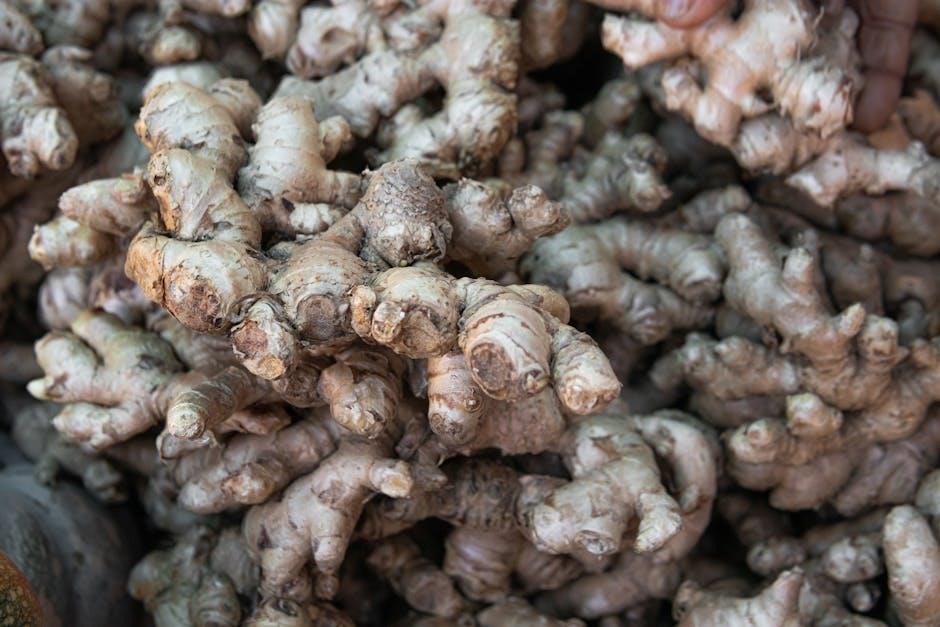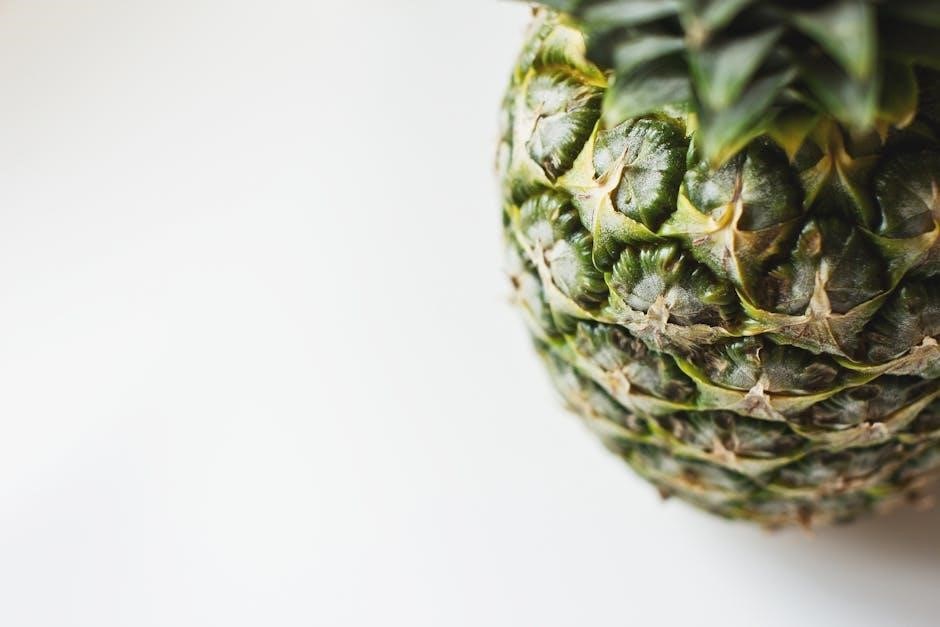Diet plays a crucial role in managing inflammation. Anti-inflammatory foods‚ such as berries and leafy greens‚ can reduce chronic inflammation and improve overall health. A free printable PDF list provides a comprehensive guide to incorporating these beneficial foods into your daily meals.
1.1 What Are Anti-Inflammatory Foods?
Anti-inflammatory foods are nutrient-rich options that help reduce inflammation in the body. They include fruits‚ vegetables‚ whole grains‚ nuts‚ and healthy fats. These foods are often high in antioxidants‚ such as polyphenols‚ which combat oxidative stress and inflammation. Examples include berries‚ leafy greens‚ and fatty fish like salmon. Incorporating these foods into your diet can promote long-term health and reduce the risk of chronic diseases. A printable PDF list of anti-inflammatory foods provides a convenient guide for making informed dietary choices.
1.2 Importance of Reducing Inflammation
Chronic inflammation is linked to various health issues‚ including heart disease‚ diabetes‚ and autoimmune disorders. Reducing inflammation through diet can improve overall well-being and prevent these conditions. Anti-inflammatory foods help neutralize harmful free radicals and promote a balanced immune response. By incorporating these foods into your meals‚ you can mitigate inflammation and enhance your body’s ability to heal and function optimally. A printable PDF list of anti-inflammatory foods offers a practical tool for achieving these health benefits.

Benefits of Anti-Inflammatory Foods
Anti-inflammatory foods reduce chronic inflammation‚ improving heart health‚ mental well-being‚ and weight management. They promote healing‚ boost immunity‚ and lower disease risks‚ enhancing overall quality of life.
2.1 Reducing Chronic Inflammation
Anti-inflammatory foods play a vital role in reducing chronic inflammation‚ a key contributor to diseases like arthritis‚ diabetes‚ and heart conditions. Foods rich in antioxidants‚ such as berries‚ leafy greens‚ and spices‚ help neutralize free radicals that trigger inflammation. Omega-3 fatty acids found in fatty fish and walnuts also combat inflammation by promoting healing and balancing immune responses. Incorporating these foods into your diet can significantly lower inflammation levels‚ improving overall health and reducing the risk of chronic diseases. A balanced diet focused on whole‚ nutrient-dense foods is essential for long-term inflammation management.
2.2 Improving Heart Health
Incorporating anti-inflammatory foods into your diet can significantly improve heart health by reducing inflammation‚ a major contributor to cardiovascular diseases. Foods like avocados‚ olive oil‚ and fatty fish are rich in healthy fats and antioxidants‚ which help lower cholesterol and blood pressure. Berries and leafy greens also support blood vessel function‚ enhancing blood flow. By focusing on whole‚ nutrient-dense foods‚ you can reduce the risk of heart disease and maintain a healthier cardiovascular system. These dietary choices promote long-term heart well-being and overall vitality.
2.3 Supporting Mental Health
A diet rich in anti-inflammatory foods can positively impact mental health by reducing inflammation‚ which is linked to conditions like depression and anxiety. Foods such as fatty fish‚ berries‚ and leafy greens contain omega-3 fatty acids and antioxidants that support brain health. These nutrients help reduce inflammation in the brain‚ promoting better mood regulation and cognitive function. Including these foods in your diet can contribute to improved mental well-being and a lower risk of mental health disorders. This makes anti-inflammatory foods a valuable part of a holistic approach to mental health care.
2.4 Aiding in Weight Management
Anti-inflammatory foods can support weight management by promoting a balanced diet and reducing inflammation‚ which is often linked to weight gain. Foods like berries‚ nuts‚ and leafy greens are nutrient-dense‚ low in calories‚ and high in fiber‚ helping you feel full longer. Their antioxidants and polyphenols also boost metabolism and reduce inflammation‚ making it easier to maintain a healthy weight. Incorporating these foods into your meals can lead to sustainable weight loss and improved overall health‚ as they naturally support a balanced and satisfying diet.

List of Anti-Inflammatory Foods
A comprehensive guide to anti-inflammatory foods‚ including fruits‚ vegetables‚ proteins‚ and whole grains. Available as a printable PDF‚ this list helps you make informed dietary choices.
3.1 Fruits
Fruits are rich in antioxidants and polyphenols‚ making them excellent anti-inflammatory choices. Berries like blueberries‚ raspberries‚ and strawberries are packed with flavonoids that reduce inflammation. Citrus fruits‚ such as oranges and grapefruits‚ offer vitamin C‚ which supports immune function and tissue repair. Apples and pears contain quercetin‚ a powerful anti-inflammatory compound. Tropical fruits like mangoes and pineapples provide vitamin A and bromelain‚ respectively‚ which aid in reducing inflammation. Incorporating a variety of colorful fruits into your diet can help combat chronic inflammation and promote overall health.
3.2 Vegetables
Vegetables are a cornerstone of an anti-inflammatory diet‚ offering a wealth of nutrients and antioxidants. Leafy greens like spinach and kale are rich in polyphenols‚ while cruciferous vegetables such as broccoli and Brussels sprouts contain sulforaphane‚ which fights inflammation. Carrots‚ beets‚ and sweet potatoes are high in vitamin A‚ reducing oxidative stress. Tomatoes provide lycopene‚ an anti-inflammatory compound‚ and mushrooms like shiitake offer immune-boosting properties. Incorporating a variety of colorful vegetables into meals supports overall health and helps combat chronic inflammation effectively.
3.3 Protein Sources
Anti-inflammatory protein sources are essential for a balanced diet. Fatty fish like salmon and mackerel are rich in omega-3 fatty acids‚ which reduce inflammation. Lean meats such as chicken and turkey‚ when free from added preservatives‚ provide clean protein. Legumes like lentils and beans offer fiber and antioxidants. Nuts and seeds‚ including walnuts and flaxseeds‚ are packed with anti-inflammatory compounds. Eggs and tofu are also beneficial‚ as they provide essential nutrients without promoting inflammation. Incorporating these protein-rich foods supports muscle repair and overall well-being.
3.4 Whole Grains
Whole grains are a key component of an anti-inflammatory diet. Oats‚ quinoa‚ brown rice‚ and whole-grain bread are rich in antioxidants and fiber‚ which help reduce inflammation. They contain anti-inflammatory compounds like polyphenols and selenium‚ promoting overall health. Whole grains support gut health and stabilize blood sugar levels‚ reducing inflammation. Incorporating whole grains into meals provides sustained energy and supports a balanced diet. They are versatile and can be easily added to breakfast‚ lunch‚ or dinner for inflammatory-fighting benefits.
3.5 Nuts and Seeds
Nuts and seeds are rich in anti-inflammatory properties‚ making them a valuable addition to your diet. Walnuts‚ flaxseeds‚ and chia seeds are high in omega-3 fatty acids‚ which reduce inflammation. Almonds and sunflower seeds provide vitamin E‚ a powerful antioxidant. These foods also contain magnesium‚ which helps regulate inflammation. Incorporating a variety of nuts and seeds supports heart health and cognitive function. They are easy to add to meals or snacks‚ offering a delicious way to fight inflammation and promote overall well-being.
3.6 Healthy Fats and Oils
Healthy fats and oils are essential for reducing inflammation. Olive oil‚ rich in oleocanthal‚ mimics ibuprofen’s anti-inflammatory effects. Avocado oil and fatty fish like salmon provide omega-3 fatty acids‚ which combat inflammation. Coconut oil contains lauric acid‚ known for its anti-inflammatory properties. Use these oils in cooking or as dressings to enhance meals. Incorporating them supports heart health and mental clarity. Moderate consumption is key‚ as excess fat can lead to weight gain‚ even from healthy sources.
Incorporating Anti-Inflammatory Foods
Incorporate anti-inflammatory foods into your diet with meal planning tips and easy recipes. Download a printable PDF list to guide your daily choices and improve health.
4.1 Meal Planning Tips
Plan meals around anti-inflammatory foods to simplify healthy eating. Start by focusing on whole‚ unprocessed ingredients like fruits‚ vegetables‚ and whole grains. Incorporate colorful vegetables‚ berries‚ and nuts into daily meals for maximum benefit. Use herbs and spices to enhance flavor without added salt or sugar. Consider meal prepping to ensure consistent intake of anti-inflammatory foods. Download a printable PDF list to organize your grocery shopping and meal ideas‚ making it easier to maintain a balanced diet. This approach supports long-term health and reduces inflammation naturally.
4.2 Easy Recipes
Incorporate anti-inflammatory foods into simple‚ delicious meals. Try a berry and spinach smoothie for breakfast‚ or a roasted sweet potato and avocado salad for lunch. A turmeric and ginger chicken stir-fry makes for a quick dinner. Use olive oil‚ herbs‚ and spices to enhance flavors without inflammation. These recipes are easy to prepare and packed with nutrients to reduce inflammation. Refer to your printable PDF list for ingredient ideas‚ ensuring meals are both healthy and enjoyable. Simplify your cooking with these anti-inflammatory recipes and start feeling the benefits today.

Foods to Avoid
Ultra-processed foods‚ sugary snacks‚ and refined carbohydrates can trigger inflammation. Limit red meat‚ dairy‚ and fried foods to reduce inflammation. Consult your printable PDF list for details.
5.1 Pro-Inflammatory Foods
Pro-inflammatory foods include ultra-processed items‚ sugary snacks‚ and refined carbohydrates‚ which can trigger inflammation. Red meat‚ dairy‚ and fried foods also contribute to inflammation. Avoiding these is crucial for reducing inflammation and improving health. Ultra-processed foods contain additives and preservatives that exacerbate inflammation‚ while sugary and high-carb foods lead to insulin spikes. Red meat and dairy can cause inflammation in some individuals due to specific compounds. Fried foods‚ high in omega-6 fatty acids‚ further promote inflammation. Limiting these foods is essential for an anti-inflammatory diet.
5.2 Ultra-Processed Foods
Ultra-processed foods are heavily modified‚ containing additives and preservatives that promote inflammation. Examples include white flour products‚ instant mashed potatoes‚ white pasta‚ white rice‚ and sugary cereals. These foods are linked to weight gain and poor health outcomes‚ exacerbating inflammation. They often contain high levels of unhealthy fats‚ sodium‚ and added sugars‚ which contribute to chronic inflammation. Limiting ultra-processed foods is essential for maintaining a balanced diet and reducing inflammation. Opting for whole‚ nutrient-rich foods instead supports overall health and well-being effectively.

Shopping List
A printable PDF list of anti-inflammatory foods helps you shop smarter. Includes fruits‚ vegetables‚ proteins‚ whole grains‚ nuts‚ seeds‚ and healthy oils for daily healthy choices.
6.1 Printable PDF Shopping List
Download a free printable PDF list of anti-inflammatory foods to simplify your grocery shopping. Organized by categories like fruits‚ vegetables‚ proteins‚ and whole grains‚ this guide ensures you never miss essential items. It includes berries‚ leafy greens‚ nuts‚ seeds‚ and healthy oils‚ making meal planning easier. The PDF format allows you to print and carry it to the store‚ helping you maintain a consistent supply of inflammation-fighting foods for better health.
Common Myths
7.1 Debunking Myths About Anti-Inflammatory Diets
Some believe anti-inflammatory diets are overly restrictive‚ but they focus on balance‚ not elimination. Others think all processed foods are bad‚ yet some‚ like canned beans‚ are fine. Natural foods aren’t always inflammation-free; some trigger reactions. Research supports these diets‚ contrary to myths. The free PDF list helps clarify these misconceptions‚ offering evidence-based guidance for a healthier lifestyle.
Many myths surround anti-inflammatory diets. One common misconception is that they are overly restrictive‚ but they focus on balance‚ not elimination. Another myth is that all processed foods are harmful‚ though some‚ like canned beans‚ can be part of a healthy diet. It’s also believed that natural foods are always anti-inflammatory‚ but some‚ like nightshades‚ may trigger inflammation in certain individuals. The free PDF list helps clarify these myths‚ offering evidence-based guidance to support a balanced and effective approach to reducing inflammation.

Scientific Backing
Research supports the effectiveness of anti-inflammatory foods. Studies highlight polyphenols in berries and omega-3s in fish‚ showing their role in reducing inflammation and improving health outcomes.
8.1 Research on Anti-Inflammatory Diets
Studies consistently show that anti-inflammatory diets reduce chronic inflammation‚ improving conditions like heart disease and arthritis. Polyphenols in berries and omega-3s in fatty fish are key players. Research highlights the importance of whole foods over supplements‚ as synergistic effects enhance benefits. Dr. Sean Spencer notes that dietary fiber in vegetables directly combats inflammation. Clinical trials demonstrate that adhering to anti-inflammatory diets lowers inflammatory markers‚ supporting long-term health. These findings emphasize the role of nutrition in preventing and managing inflammatory diseases.
Incorporating anti-inflammatory foods into your diet can significantly reduce inflammation and improve overall health. Download the free PDF list to easily start your journey toward a healthier lifestyle.
9.1 Starting Your Anti-Inflammatory Journey
Embarking on an anti-inflammatory journey begins with small‚ mindful changes to your diet. Downloading a printable PDF list of anti-inflammatory foods can serve as a valuable guide. These foods‚ such as berries‚ leafy greens‚ and whole grains‚ are packed with nutrients that help reduce inflammation and improve overall health; Meal planning and incorporating simple‚ nutritious recipes can make the transition easier. Remember‚ this is a lifestyle shift‚ not a temporary diet; By focusing on whole‚ unprocessed foods‚ you can take the first steps toward a healthier‚ inflammation-free life.

Additional Resources
Download a free printable PDF list of anti-inflammatory foods to guide your journey. Explore additional reading materials and reputable sources for deeper insights into inflammation management.
10.1 Recommended Reading
Explore comprehensive guides and research-based books on anti-inflammatory diets. Discover the science behind inflammation-reducing foods and download free PDF resources for meal planning. Learn about the benefits of berries‚ leafy greens‚ and omega-3 rich foods from experts like A.V. Sidorov. These materials offer practical tips and recipes to incorporate anti-inflammatory foods into your daily routine‚ promoting overall health and well-being. Find additional resources on reputable websites and scientific journals for a deeper understanding of inflammation management.